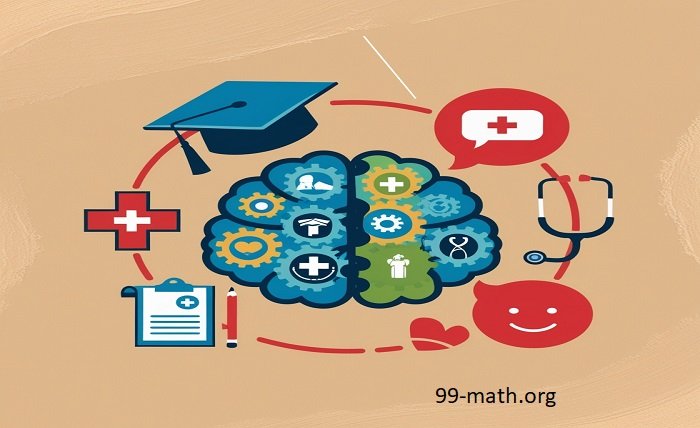Introduction
The relationship between education health psychology, health, and education is more important than ever in the quickly changing world we live in today. The interaction of these categories determines a person’s general quality of life, academic success, and well-being. This blog post intends to investigate the relationship between education and health psychology, the function of psychological concepts in fostering academic performance, and the wider social ramifications of these connections.
Defining Education, Health, and Psychology
education health psychology, health, and education are three interconnected disciplines with a big influence on people’s lives and society. The methodical process of acquiring the knowledge, abilities, attitudes, and values necessary for both professional and personal growth is called education. It includes receiving formal education, engaging in non-formal learning, and developing critical thinking skills. Beyond the mere absence of illness, health refers to a condition of total physical, mental, and social well-being. It enhances a person’s total quality of life by encompassing social harmony, mental stability, emotional stability, and physical fitness.
The Impact of Education on Health
education health psychology knowledge, preventive habits, and access to healthcare, education has a significant impact on health. Higher educated people are typically better at comprehending and using health information, enabling them to take preventive measures and make educated decisions about their health. People with higher levels of education are also more likely to engage in good habits that improve health, such as regular exercise, a balanced diet, and regular checkups with the doctor. Furthermore, there is frequently a positive correlation between increased education and better access to healthcare services, such as medical resources and health insurance. Consequently, those with higher levels of education typically have better general health and a longer life expectancy, underscoring the critical role that education plays in promoting and maintaining health.
Psychological Factors Influencing Educational Success
education health psychology variables have a significant impact on motivation, self-efficacy, emotional intelligence, and cognitive growth, all of which shape academic achievement. Students are motivated to engage with and thrive in their academic activities by both internal and external factors. Extrinsic motivation derives from rewards and recognition from outside sources, but intrinsically motivated pupils discover personal fulfillment and enjoyment in studying. Self-efficacy, or the conviction in one’s own skills, influences perseverance and fortitude in the face of difficulties, which in turn affects scholastic achievement. Theories of cognitive development, like those of Lev Vygotsky and Jean Piaget, provide light on how knowledge is acquired by students at various developmental stages. Understanding and controlling one’s own emotions as well as those of others is a key component of emotional intelligence, which improves academic achievement and interpersonal connections while also fostering overall educational success.
The Role of Health Psychology in Education
Because it addresses stress management, encourages education health psychology behaviors, and offers mental health assistance, health psychology is essential to education. Health psychologists create and put into practice stress management techniques for students, which are essential for both their general well-being and academic success. To lower stress and increase focus, methods including mindfulness, deep breathing exercises, and efficient time management are used. Furthermore, health psychologists create behavioral interventions to promote healthy habits among students, like exercise, a balanced diet, and good sleeping habits. In order to help students deal with mental health issues like anxiety and depression, they also offer counseling and therapy. This promotes a more encouraging and effective learning environment.
Integrating Psychological Principles into Educational Practices
The teaching and learning processes can be greatly improved by incorporating education health psychology concepts into instructional strategies. Collaborative projects and problem-based learning are examples of active learning strategies that draw students in and help them comprehend and remember the content better. Students are inspired to pursue academic success when they get positive reinforcement in the form of incentives and helpful criticism. Tailoring lessons to each student’s unique needs and learning style results in more efficient learning that takes into account their interests and talents. Establishing a classroom climate that is both empathic and supportive, where students feel appreciated and understood, improves their mental health and fosters a more learning-oriented environment.
Future Directions in Education, Health, and Psychology
New directions and discoveries in study are influencing the fields of education health psychology in the future. Technology integration is changing how education and healthcare are delivered by providing new avenues for improving learning and access to resources for health. Examples of this include telehealth services and digital learning tools. Personalized learning strategies, which use data analytics to customize learning experiences for each student, have the potential to enhance academic performance and meet specific health needs. Supporting students’ emotional health and academic achievement requires raising awareness of mental health concerns and implementing mental health education into the curriculum. These directions for the future emphasize the necessity of continuous innovation and research to meet the changing requirements of people and society.
Conclusion
There are many different facets and intricate interactions among education health psychology. Greater general well-being, better health outcomes, and better educational methods can result from an understanding of how these domains interact. We may establish settings that encourage both academic and personal achievement by incorporating psychological concepts into education, attending to health concerns, and taking socioeconomic aspects into account.
FAQ
How does education influence health outcomes?
By raising health literacy, encouraging preventative education health psychology practices, and facilitating easier access to healthcare resources, education enhances health outcomes.
What psychological factors impact academic success?
Important education health psychology variables that affect academic achievement include motivation, self-efficacy, emotional intelligence, and cognitive development.

